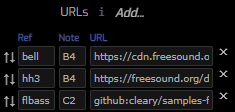/ Examples / Utility / SampleMgr
NoteStreams .. Instruments
Filters .. Effects .. LiCK Effects
Plot .. Utility .. Pure ChucK
SampleMgr Node
The SampleMgr utility node manages audio sample files and supports the lazy-downloading of sample files from internet-hosted sample bank repositories. The SampleMgr node is required by Tidal and SampleInst and supported by a growing list Fiddle nodes.
The basic idea is to associate a client's semantic instrument name, eg piano, with a concrete collection of sample files.
Sample files are divided into three categories according to the strategy employed for finding and managing them.
Samples are internet-hosted sample files that are defined by the combination
of Banklist and TOC files. These JSON files register bank names, bank contents
and URLs for every sample file available for automatic management.
URLs is used to manually associate individual internet sample files with
a semantic name and base note.
Files is used to manually associate local sample files with a semantic name
and base note.
The
base noteis used to re-pitch notes by altering the sample playback rate according to its distance from a target note. For example, apiano sample bank may contain a dozen or so representative notes across the piano's range. We use these samples to produce nearby notes by re-pitching them.
Having built up associations between semantic names, aka Refs, the SampleMgr
can be relied upon by its downstream nodes to convert a ref to a filename.
When not present in your local samplefile cache, SampleMgr will attempt to
download sample files before your performance can begin. Once a sample
file is present in the cache, it can be played instantly with no download delays.
Here is a typical download notification that might appear in the Log.
12:17 note [chuck] DbSampleMgr/0: cached https://raw.githubusercontent.com/ritchse/tidal-drum-machines/main/machines/RolandTR808/rolandtr808-sd/SD7575.WAV
Depending on your SampleMgr configuration and the state of your local cache you may see 10s or 100s of these log messages and the initial startup time of your project may require seconds or minutes to sort things out.
Default Sample Banks
Fiddle ships with a set of defaults that should get you going immediately. The factory-default files are copied automatically into your Workspace and may be auto-updated with each release. These are default settings that you can easily augment or replace. We recommend that you make alterations in a copy of these files and not to the factory files. Then make sure to update your Banklist parameter described below.
You can find the default sample banks here and a simple TOC file here. Of particular note are the large banks:
Dirt - grab-bag of live-coding sounds from the
TidalCycles collection (.wav).
DrumKits - large collection of drum machines
found here (.wav).
VCSL - nice collection of miscellaneous and exotic instruments
found here (.wav).
midi-js-soundfonts - Three General MIDI sound fonts broken out into .mp3
files found here.
Parameters

Samples depend entirely on the banks and voices defined in your
Banklist file. This is the most powerful representation because
we have entire contents lists (TOC-files) for each bank and each voice
can contain note-specific or indexed voice variants. At right
you can see that we've registered interest in 9 of the voices of
the VCSL bank. Keep in mind that by registering interest in these
voices, SampleMgr will ensure that they reside in your local cache
when you initiate your performance. You can load all voices of
bank (tread carefully) by entering * for the voice. When doing
so, there is no single reference that makes sense for a reference.
Thus, you should enter * in the reference field as well. Now your
references are contrained to the voice names within a sample bank.
For example, you can load all the voices in of EmuSP12 from the
DrumKits multi-bank.
URLs bypass the banklist and allow you to enter the URLs to
internet sample files directly. Note in the screengrab below that
we are required to assign a basenote to each sample to facilitate
repitching. For percussion sounds you may not require re-pitching and
so this value is of no consequence.

Files is the sibling of URLs but supports local filenames of your
favorite samples. Like URLs, Files bypasses the banklist and requires
both Ref and Note fields. You can drag-drop sample files from the
Workspace panel into the filename fields.
Banklist is the name of a banklist file for resolving all the Sample
references as discussed above. The default banklist, _cache/_fiddleBanks/banklist.json,
is installed when you launch Fiddle and may be updated with Fiddle updates.
You are free to modify it, but beware that your changes might be stomped
on by newer versions. For this reason, we recommend that you make changed
into your own banklist file and store it outside the _cache subdirectory.
Make sure to update this in every SampleMgr node as well.
Cachedir is the name of your _cache directory into which to place
auto-populated sample files. The default of _cache is Workspace-relative.
If you want to use an external drive or alternate location enter its
full pathname here. Make sure to update this in every SampleMgr node as well.
Examples
See SampleInst or Tidal.